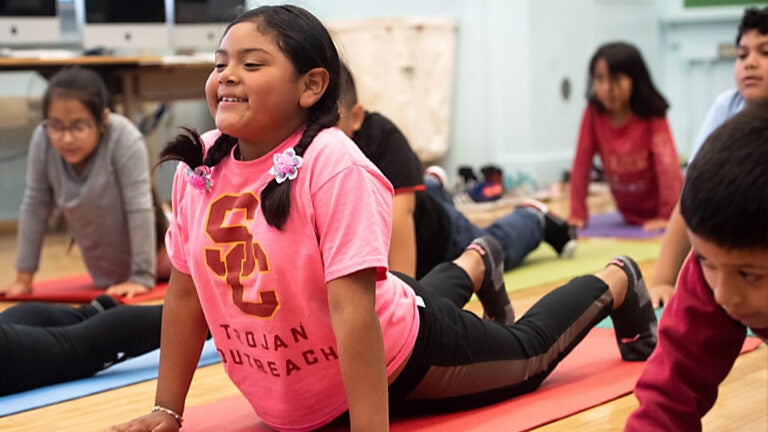
How USC Dornsife pioneered wellness for inner-city grade school kids
In the wake of rising mental health struggles among students, schools across the United States are turning to mindfulness practices like yoga and meditation to help children manage stress and emotions. Endorsed by the U.S. Centers for Disease Control and Prevention following the COVID-19 pandemic, these programs are especially beneficial in low-income communities where students face heightened levels of trauma.
While many schools are just now adopting these tools, the Little Yoginis program at the USC Dornsife College of Letters, Arts and Sciences has been ahead of the curve, using yoga to help inner-city children in Los Angeles find peace and focus for more than a decade.
At Martin Luther King Jr Elementary near USC’s University Park Campus, for example, second graders eagerly unroll their yoga mats, ready for their Little Yoginis session. USC students enrolled in “Principles of Yoga Through Community Outreach” (PHED 127), a course offered through USC Dornsife’s Department of Physical Education & Mind Body Health, guide the children and their teacher, instructing them on calming breathing practices and yoga postures.
USC introduced PHED 127 in the spring of 2022 in conjunction with USC Dornsife’s Joint Educational Project (JEP). The course builds on the initiative that Tina Koneazny, JEP’s associate director of administration and educational outreach, created in 2013 as part of JEP’s ReadersPlus program.
The Little Yoginis sessions, which integrate principles of yoga with children’s literature, have helped young students better manage stress and emotions — long before mindfulness programs gained traction across the country.
“Many children in our program are from immigrant families struggling to keep their families together and support them in their education, which can be difficult if they are not fluent in English,” says Koneazny, who teaches PHED 127 as a part-time faculty member in the department. “We focus on helping these students develop a sense of calm and control in their daily lives. Through yoga and breathing techniques, we help them learn skills to center themselves, become more focused and build confidence.”
Each session begins with a story time element, where a USC student reads a book tied to a theme of wellness or kindness. For example, reading Shel Silverstein’s The Giving Tree might lead to the class practicing the tree pose. “The stories we choose reinforce some of the moral yogic principles, such as nonviolence, discipline and contentment,” Koneazny adds.
With Little Yoginis now offered through PHED 127, the program benefits more elementary school students. Originally limited to small groups of children after school, “we can reach more students because our teams of three or four USC students work with full classrooms, as many as 35 students,” Koneazny says.
The USC student instructors learn yoga and mindfulness techniques from Koneazny while earning course credits, and they reap the rewards of serving the community.
“The palpable excitement among the kids was heartwarming,” said Mehr Kotval, a junior double-majoring in archaeology and political science at USC Dornsife. “Each time we came into the classroom to tell the kids it was time for yoga, there were many excited cheers. The students found excitement in challenging themselves with yoga poses they initially thought were beyond their capabilities.”
A growing national movement
As schools increasingly recognize the mental health benefits of mindfulness programs, more institutions are following a path similar to that of Little Yoginis. A recent Associated Press article highlights how yoga and meditation are being introduced in classrooms to support student well-being.
“It’s rewarding to see schools around the country embracing what we’ve been doing for years,” Koneazny says. “These practices are especially impactful for kids in high-stress environments.”
For Lenicia B. Weemes Elementary School first-grade teacher Erika Ramirez, the program has made a noticeable difference. “It was wonderful to see their positive energy and kindness grow through yoga,” she says.
Students echo this sentiment, with one third grader sharing how after yoga, “all my stress goes away.”
A program built on service
What makes the Little Yoginis program particularly unique is its integration of service learning. USC students, trained as “USC Yogis,” work directly with the children, teaching yoga techniques and modeling positive behavior. This hands-on approach has been transformative for both university and elementary students alike.
“It’s a two-way street,” Koneazny notes. “Our USC students teach, but they also grow through their connections with these young students. It’s a deeply rewarding experience on both sides.”
Editor’s Note: Darrin S. Joy and Jim Key contributed to this article.